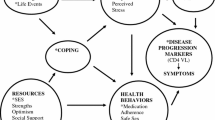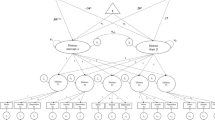Abstract
This pilot study investigates the correlation between psychological stress and antiretroviral therapy (ART) adherence and plasma HIV RNA (viral load) as mediated by psychological flexibility among Black men in the south. Data were collected from 48 HIV-positive, low income Black men. Results indicate a strong positive correlation between perceived stress and psychological inflexibility (adjusted for age and income rs = 0.67; p < 0.001), a negative correlation between psychological inflexibility and ART adherence (adjusted rs = − 0.32; p = 0.03), a negative correlation between perceived stress and ART adherence (adjusted rs = − 0.45; p = 0.006), and a negative correlation between ART adherence and viral load (adjusted rs = − 0.37; p = 0.04). Our findings suggest stress decreases adherence to ART and viral suppression among Black men living with HIV. However, psychological flexibility did not mediate the relationship between stress and treatment adherence. Hair cortisol concentrations were high (mean of 34.2 pg/mg), but uncorrelated with adherence.


Similar content being viewed by others
References
US Centers for Disease Control and Prevention. HIV in the Southern United States. CDC Issue Brief. Atlanta: US Centers for Disease Control and Prevention; 2016.
Tennessee Department of Health. 2018. https://www.tn.gov/content/dam/tn/health/program-areas/hiv/2017_HIV_Epi_Profile.pdf.
National HIV Strategy. National HIV/AIDS Strategy: Updated to 2020. Indicators-at-a-Glance. 2019.
Cohen MS, Chen YQ, McCauley M, Gamble T, Hosseinipour MC, Kumarasamy N, et al. Antiretroviral therapy for the prevention of HIV-1 transmission. N Engl J Med. 2016;375(9):830–9.
Keuroghlian AS, et al. Trauma, Dissociation, and antiretroviral adherence among persons living with HIV/AIDS. J Psychiatr Res. 2011;45:942–8.
Bogart LM, Wagner GJ, Galvan FH, Klein DJ. Longitudinal relationships between antiretroviral treatment adherence and discrimination due to HIV-serostatus, race, and sexual orientation among African-American men with HIV. Ann Behav Med. 2010;40(2):184–90.
Thames AD, Moizel J, Panos SE, Patel SM, Byrd DA, Myers HF, et al. Differential predictors of medication adherence in HIV: findings from a sample of African American and Caucasian HIV-positive drug-using adults. AIDS Patient Care STDS. 2012;26(10):621–30.
Evans GW, Schamberg MA. Childhood poverty, chronic stress, and adult working memory. Proc Natl Acad Sci USA. 2009;106(16):6545–9.
Weinstein TL, Xiaoming L. The relationship between stress and clinical outcomes for persons living with HIV/AIDS: a systematic review of the global literature. AIDS Care. 2016;28(2):160–9.
Sun Y, Gao L, Kan Y, Shi B-X. The Perceived Stress Scale-10 (PSS-10) is reliable and has construct validity in Chinese patients with systematic lupus erythematosus. Lupus. 2018;28(2):149–55.
Anderou E, Alexopoulous EC, Lionis C, Varvogl L, Gnardellis C, Chrousos GP, Darviri C. Perceived stress scale: reliability and validity study in Greece. Int J Environ Red Public Health. 2011;8:3287–98.
Reis RS, Hino AAF, Anez CRR. Perceived stress scale: reliability and validity study in Brazil. J Health Psychol. 2010;15:107.
Gow R, Thomson R, Rieder M, Van Uum S, Koren G. An assessment of cortisol analysis in hair and its clinical applications. Forensic Sci Int. 2010;196(1–3):32–7.
Wosu A, Gelaye B, Valdimarsdóttir U, Kirschbaum C, Stalder T, Shields A, Williams M. Hair cortisol in relation to sociodemographic and lifestyle characteristics in a multiethnic US sample. Ann Epidemiol. 2015;25:90–5.
Spencer RL, Deak T. A users guide to the HPA axis. Physiol Behav. 2017;178:43–65.
Pochigaeva K, Druzhkova T, Yakovlev A, Onufriev MV. Hair cortisol as a marker of hypothalamic-pituitary-adrenal axis activity in female patients with major depressive disorder. Metab Brain Dis. 2017;32(2):577–83.
Rohleder N. Acute and chronic stress induced changes in sensitivity of peripheral inflammatory pathways to the signals of multiple stress systems—2011 Curt Richter Award Winner. Psychoneuroendocrinology. 2012;37(3):307–16.
Segerstrom SC, Miller GE. Psychological stress and the human immune system: a meta-analytic study of 30 years of inquiry. Psychol Bull. 2004;130(4):601–30.
Smith SM, Vale WW. The role of the hypothalamic-pituitary-adrenal axis in neuroendocrine responses to stress. Dialogues Clin Neurosci. 2006;8(4):383–95.
DeHouwer J, Hughes S, Barnes-Holmes D. Associative learning as higher order cognition: learning in human and nonhuman animals from the perspective of propositional theories and relational frame theory. J Comp Psychol. 2016;130(3):215–25.
Hayes SC, Strosahl KD, Wilson KG. Acceptance and commitment therapy (2nd edition): the process and practice of mindful change. 2nd ed. New York: Guilford Press; 2012.
Graham CD, Gouick J, Krahé C, Gillanders D. A systematic review of the use of Acceptance and Commitment Therapy (ACT) in chronic disease and long-term conditions. Clin Psychol Rev. 2016;46:46–58.
Moitra E, LaPlante A, Armstrong ML, Chan PA, Stein MD. Pilot randomized controlled trial of acceptance-based behavior therapy to promote HIV acceptance, HIV disclosure, and retention in medical care. AIDS Behav. 2017;21(9):2641–9.
Hayes SC, Luoma JB, Bond FW, Masuda A, Lillis J. Acceptance and commitment therapy: model, processes and outcomes. Behav Res Ther. 2006;44(1):1–25.
Ironson G, O’Cleirigh C, Fletcher MA, Laurenceau JP, Balbin E, Klimas N, Schneiderman N, Solomon G. Psychosocial factors predict CD4 and viral load change in men and women with human immunodeficiency virus in the era of highly active antiretroviral treatment. Psychosom Med. 2004;67(6):1013–21.
Harris PA, Taylor R, Thielke R, Payne J, Gonzalez N, Conde JG. Research electronic data capture (REDCap)—a metadata-driven methodology and workflow process for providing translational research informatics support. J Biomed Inform. 2009;42(2):377–81.
Sternthal M, Slopen N, Williams DR. Racial disparities in health: how much does stress really matter? Du Bois Rev. 2011;8(1):95–113.
Wright Dom Naar-King S, Lam P, Templin T, Frey M. Stigma scale revised: reliability and validity of a brief measure of stigma for HIV + youth. J Adolesc Health. 2007;40(1):96–8.
Williams DR, Williams-Morris R. Racism and mental health: the African American experience. Ethn Health. 2000;5:243–68.
Gray M, Litz B, Hsu J, Lombardo T. Psychometric properties of the Life Events Checklist. Assessment. 2004;11:330–41.
Loussouran G, Lozano I, Panhard S, Collaudin C, El Rawadi C, Genain G. Diversity in human hair growth, diameter, colour, and shape. An in vivo study on young adults from 24 different ethnic groups observes in five continents. Eur J Dermatol. 2016;26(2):144–54.
Loussouran G. African hair growth parameters. Br J Dermatol. 2001;145(2):294–7.
Bond FW, Hayes SC, Baer RA, Carpenter KM, Guenole N, Orcutt HK, Waltz TZ, Zettle RD. Preliminary psychometric properties of the Acceptance and Action Questionniare - II: a revised measure of psychological flexibility and experiential avoidance. Behav Ther. 2011;42:676–88.
Kalichman SC, Amaral CM, Swetzes C, Jones M, Macy R, Kalichman MO, Cherry C. A simple single-item rating scale to measure medication adherence: further evidence for convergent validity. J Int Assoc Provid AIDS Care. 2009;8(6):367–74.
Liu Q, Li C, Wanga V, Shepherd BE. Covariate-adjusted Spearman’s rank correlation with probability-scale residuals. Biometrics. 2018;74:595–605.
Vranceanu AM, Safren SA, Lu M, Coady WM, Skolnik PR, Rogers WH, Wilson IB. The relationship of post-traumatic stress disorder and depression to antiretroviral medication adherence in person with HIV. AIDS Patient Care and STDs. 2008;22(40):313–21.
Bottonari KA, Safren SA, McQuaid JR, Hsian CB, Roberts JE. A longitudinal investigation of the impact of life stress on HIV treatment adherence. J Behav Med. 2010;33(6):486–95.
Nakimuli-Mpungu E, Misisi S, Wamala K, Okello J, Ndyanabangi S, Birungi J, et al. Recruitment and baseline characteristics of participants in the social, emotional, and economic empowerment through knowledge of group support psychotherapy study (SEEK-GSP): cluster randomized controlled trial. JMIR Res Protoc. 2019;8(1):11560.
Webel AR, Sattar A, Schreiner N, Kinley B, Moore SM, Salata RA. The impact of mental wellness on HIV self- management. J Asssoc Nurses AIDS Care. 2016;27(4):468–75.
Wosu AC, Gelaye B, Valdimarsdottir U, Kirschbaum C, Stadler T, Shields AE, Williams MA. Hair cortisol in relation to socio-demographic and lifestyle characteristics in multi-ethnic US. Ann Epidemiol. 2015;25(2):90–5.
Acknowledgements
We are grateful to the individuals living with HIV who volunteered for this study. This work was supported by a Developmental Core Award to RLC from the Tennessee Center for AIDS Research (Grant No. P30 AI110527).
Author information
Authors and Affiliations
Corresponding author
Additional information
Publisher's Note
Springer Nature remains neutral with regard to jurisdictional claims in published maps and institutional affiliations.
Rights and permissions
About this article
Cite this article
Cooper, R.L., Brown, L.L., Tabatabai, M. et al. The Effects of Perceived Stress and Cortisol Concentration on Antiretroviral Adherence When Mediated by Psychological Flexibility Among Southern Black Men Living with HIV. AIDS Behav 25, 645–652 (2021). https://doi.org/10.1007/s10461-020-03016-8
Published:
Issue Date:
DOI: https://doi.org/10.1007/s10461-020-03016-8




